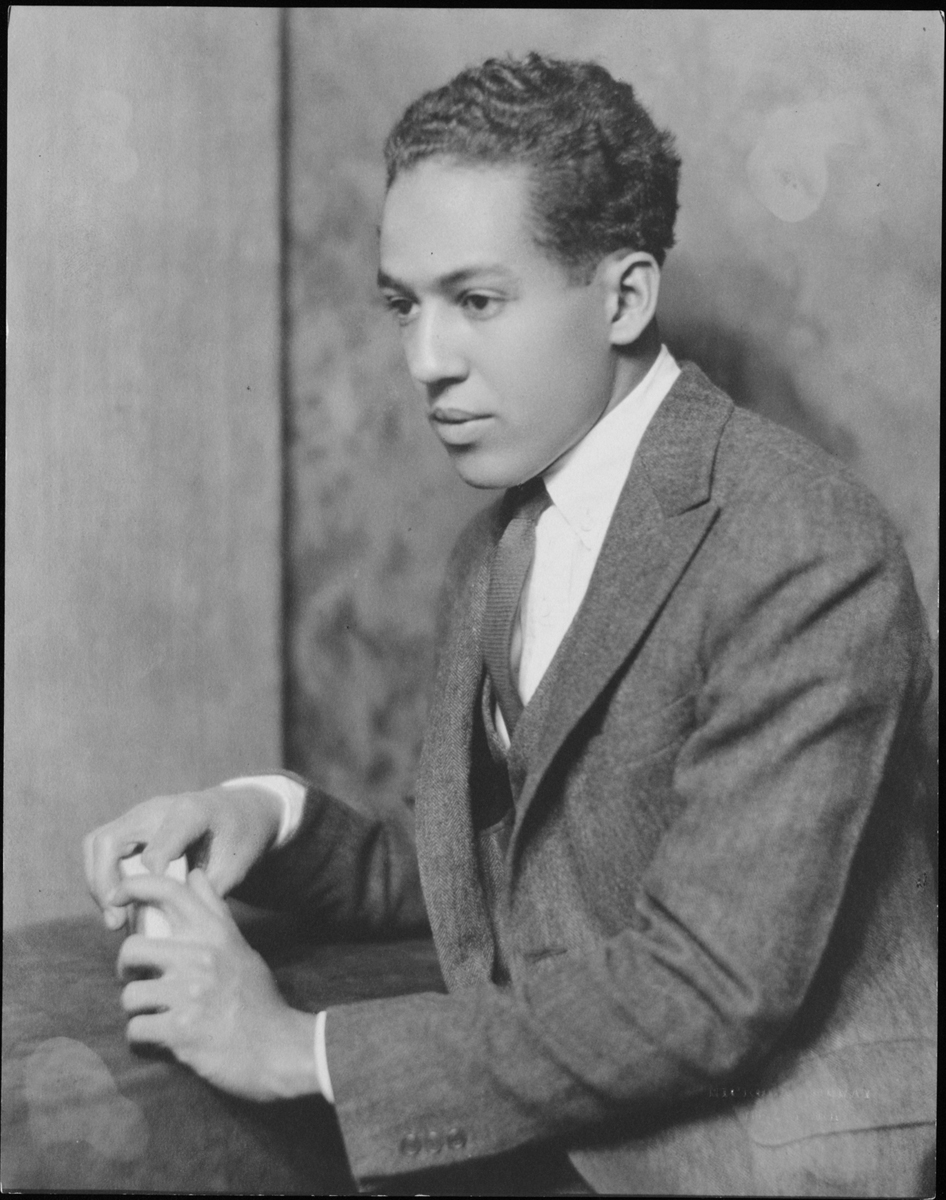Respond to a Reading: “The Negro Speaks of Rivers” by Langston Hughes
Respond to a Reading: Langston Hughes, “The Negro Speaks of Rivers”
Read the poem “The Negro Speaks of Rivers” below and respond to the questions in the margin. When you are done, “submit” your response.
Langston Hughes

Langston Hughes was born in Joplin, Missouri. His father was a businessman and lawyer and his mother was a teacher. Hughes attended Columbia University, graduated from Lincoln University in 1929, traveled throughout the world, and held many odd jobs as a young man. Hughes had a long and prolific career as a writer in all genres and was the central figure of the Harlem Renaissance, a 1920s movement committed to the examination and celebration of black life in America and its African heritage. He was the Madrid correspondent for the Baltimore Afro-American (1937) and a columnist for the Chicago Defender (1943-67) and the New York Post (1962-67). Hughes’s poems of racial affirmation and protest are often infused with the rhythms of blues and jazz music. He wrote more than two dozen plays (many set to music) and founded the Suitcase Theater (Harlem, 1938), the New Negro Theater (Los Angeles, 1939), and the Skyloft Players (Chicago, 1941). His works include The Weary Blues (1926), Montage of a Dream Deferred (1951), and The Panther and the Lash: Poems of Our Times (1969).
Hughes uses both repetition and variation in the first three and the last three lines of “The Negro Speaks of Rivers.” Why might he have chosen to repeat these lines, even in a relatively short poem? What is significant about his change to the lines when they reappear at the end?
Question
IC9GioZYYU4UvU4ECc9PyYjk3JG1ohs1DZlMFygG8ZVoWUxGuG62GbV9j0jIEOAznazyYyAvLfZU2e+M8zXxo8P2lv8BnCaUzZLEVTHs+bA18en7xHlrhI7NTsKX8ljoWQju81vyr78hVxGGzJOoWQBSfH2TefquTxYBRENR/0DkVXaRSlVazktAq1YudU+SNLWe8iU6rQjLyuXMaEb4Y6KZK1a4+OAUqe1mvtlLwdVLNuYxMFxSORonKp8jPKiVOwLJjsPMzlnzK4RoEdXN0U74UbedRs33bBJiDDutBGejVbYX7JHQvwh6Y/Do9x/OamL9BRYrdXMJmoSVJA8h7P6HeBjc94CkfeZNUxHFOopBwHRFlntK79U5YXBG5ZzvCv2nRY2gFzpyDA1/N4BsiDGYtiraUfmgThis poem might be classified as a dramatic monologue, a poem spoken by a character and often named but here identified just as “the Negro.” Consider the poem as a dramatic speech: How would you characterize the voice of the speaker? What can you tell about him (or her) based on the choice of words and the rhythm of phrases?
Question
lr+caJkJdKg2QTrlG2sVRKTraUFG24QMBx8kW+kWNMGOAzAdg/CWnfF6AmYsQZ0GNXSKkWy46xVhTusipvcOJq6C2qNfoO5C2XTfHVNw4yQEfW+6QM9glkA7bVHPf0UuHjn33mCCVb9Y+I6k+pPa6OJM8FoyVEoeTEwxxnpoontSnOQshMe/m3q8K1IzfpmPKYEcWKAtGu1DNMx9isS4yIAe+M5NthE35esGQH74+dJTNPhT63KP44WmWeFOotBAo89/WQBMhmwiGq7bNrfFzWuvMewxLprXmnRxBofgsP5Dv6p26PpMEYLQUZDclucYa8Y40N3wlEjatk2al2es7InSauNJ/UATmKkQ7IYsx1lSG92U99mkcX5zpsFTLGCQUER3solZ2+b/Ln0EKVndDMgnUnqasy6+jdhXgs5cZLYgnu3o+6MRrnbAo3Y6KxST39SPSY7Fp8FAq+tfo46NTNr3LqW6DNXuDescribe Hughes’ image of the Mississippi River at sunset. What picture does he paint for the reader in that line? How do you understand the larger, symbolic significance of mud transformed into gold? Why does he describe the sound of the river as “singing”?
Question
qwem1m0649YgKiY7Cv5Qc8dUKlw0u012WZwpxd/H3t1F4Wst1dLMZ/0+4sm61VnoL+DwTtKYXCH+hqLRWP5SfeCAZUpSA4XMjrKUPqlkJ7pgYy2OCLGciXDvlNcmusIbJ828DCrwOb2ShdjdDI52BdBQYftY7I6uuwvq/VNZZLWE4DYYYWCYzTsv6VNH1l89DO/vKmZ5rawqLWW3o2igSQ+pqwcIM27F2xc2k/KxCkgKerkrm5ALcINBqg4ewVO4OlGwUxin6XpV+AqXb7J+Wvuoss4WNv3Zc2ndjWTYDTw9epq/XArn4VHR9o4dpG0c9emnq+iI47mdAgd2Af3vYxcU09kJ/aVGnMwjYCdkMSSjYouZrc1A6gHes7Ch1iiLBxpMPA==Notice the points at which Hughes changes his verb tenses in the poem, moving from present perfect (e.g., “I have gone”) to simple past (e.g., “I went”) and back. How are the actions in the middle section (bathing, building) different from the actions (knowing, growing) at the beginning and end?
Question
nPJA/W++7uL+LgHZnSOyBDmy/cNpJpb/z8w57kVRNLVhDs+7C+ZwA/J74oI8DIyNjNtMRJgW+ISTk51K5Z6bMBZ06Q2vQdrDbs7OM3iFHtqMI8iO5IScHOs2FGplRYIHd9AYvtwUrH6U1GQQUTczy30K5xWjn3xKPEAFwAxnGQvhw1IIQhECLvZ+SE19jFoeOBsBW8Rp9xpEzfqdvzxz3PYAVDLPWP0r/7DgsnRPsN5nCsbg4ldlw8Vw9rdWsp/znntNNsLFkSGfqGNxIiE8cOiM/2Z4DqA7l/SMLrCJtyA9No1DLRS0HbksW61UyQ5JV7jKLfyKND4ArMhElhleT+uen+CD8NdLxwftwIUlOH+jhxSQEefJHywAVyUAzfXFIP9/NKf2shzcqCGTbtqRgvwIJHfLWESSUO2/TlmoJbDW+QHUmwozFjeSBB0=The Negro Speaks of Rivers
1
I’ve known rivers:
I’ve known rivers ancient as the world and older than the flow of human blood in human veins.
My soul has grown deep like the rivers.
2
I bathed in the Euphrates when dawns were young.
I built my hut near the Congo and it lulled me to sleep.
I looked upon the Nile and raised the pyramids above it.
3
I heard the singing of the Mississippi when Abe Lincoln went down to New Orleans, and
I’ve seen its muddy bosom turn all golden in the sunset.
4
I’ve known rivers:
Ancient, dusky rivers.
My soul has grown deep like the rivers.